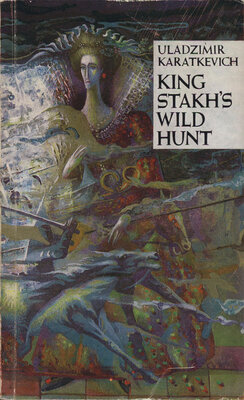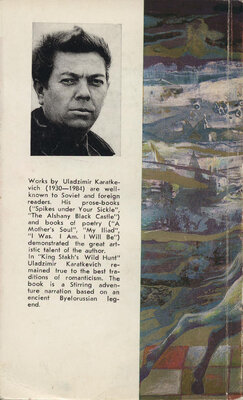But even now I sometimes see in a dream the grey heather and the stunted grass of the waste land, and King Stakh’s Wild Hunt leaping, dashing through the marshes. The horses’ bits do not tinkle, the silent horsemen are sitting up straight in their saddles. Their hair, their capes, their horses’ manes are waving in the wind, and a lonely star is burning overhead.
King Stakh’s Wild Hunt is racing madly across the earth in terrifying silence.
I awaken and think that its time is not yet over, not as long as gloom and darkness and cold, social inequality and dark horror exist on earth. Across the land, half drowned in fog, still dashes The Wild Hunt.
CONTENTS
Chapter the First 4
Chapter the Second 36
Chapter the Third 51
Chapter the Fourth 72
Chapter the Fifth 106
Chapter the Sixth 128
Chapter the Seventh 131
Chapter the Eighth 146
Chapter the Ninth 159
Chapter the Tenth 169
Chapter the Eleventh 181
Chapter the Twelfth 193
Chapter the Thirteenth 200
Chapter the Fourteenth 207
Chapter the Fifteenth 215
Chapter the Sixteenth 232
Chapter the Seventeenth 240
Chapter the Eighteenth 263
Chapter the Nineteenth 268
Uladzimir Karatkevich KING STAKH S WILD HUNT A STORY
Translated from the Byelorussian by MARY MINTZ
Edited by GRAHAM WHITTAKER
Illustrated by ULADZIMIR VISHNEVSKY Minsk, Yunatstva Publishers, 1989 Перевод сделан no нзданню:
Уладзімір Караткевіч. Вока тайфуна: Апавяданні і аповесці. Мн„ «Маст. літ.*, 1974.
(0-50) Printed in the USSR
Works by Uladzimir Karatkevich (1930—1984) are wellknown to Soviet and foreign readers. His prose-books ("Spikes under Your Sickle", "The Alshany Black Castle") and books of poetry ("A Mother's Soul", "My Iliad", "I Was. I Am. I Will Be") demonstrated the great artistic talent of the author.
In "King Stakh's Wild Hunt" Uladzimir Karatkevich remained true to the best traditions of romanticism. The book is a Stirring adventure narration based on an encient Byelorussian legend.
 КНІГІ ОНЛАЙН
КНІГІ ОНЛАЙН


